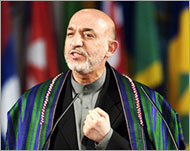Karzai allies lead Afghan poll results
Allies of Afghan President Hamid Karzai appear to have won a majority of seats in Afghanistan’s first democratic parliamentary vote in more than three decades.

With results finalised on Saturday after weeks of delay, the announcement was hailed as a step towards peace, but also confirmed expectations of a parliament dominated by regional commanders responsible for years of bloodshed.
Some members of the ousted Taliban government have also won seats.
None the less results of the vote, held in September, were welcomed as a milestone in Afghanistan’s transition to democracy.
“It is an historic moment for Afghans,” presidential spokesman Karim Rahimi told AFP.
“We expect the Afghan people to accept this as a good opportunity to move towards democracy and peace and stability in Afghanistan,” he said.
Taliban loyalists
Loyalists of the former Taliban government have mounted an insurgency against Karzai’s US-backed government that has claimed about 1400 lives this year and undermined Afghanistan’s attempts to rebuild.
Nearly 20,000 US-led soldiers have been based in the country since 2001 to try to round up the rebels but attacks have been unrelenting.
|
“It is an historic moment for Afghans” Karim Rahimi, |
The last hold-up to the result of the 18 September vote – initially due in the final week of October – was a complaint of cheating in the ballot-count in the key southern province of
Kandahar.
An investigation had resulted in a change to the province’s representatives to the lower house of parliament, the Wolesi Jirga, the Joint Electoral Management Body (JEMB), which organised the poll, said.
“We are happy the elections for the provincial councils and Wolesi Jirga are over, even though there were some minor problems,” JEMB spokesman Sultan Baheen told AFP. “This is a victory for the Afghan people.”
Ballot rigging
After the departure of the Taliban, Afghanistan adopted an internationally supported path towards democracy that included the first ever presidential elections in October last year.
The September parliamentary elections, the first since 1969, were the final stage of the plan, although widespread corruption and ballot rigging have lead some to question the legitimacy of the vote.
 |
|
Allies of President Hamid Karzai |
More than 50 election staff were dismissed during the vote and subsequent count for alleged irregularities.
Seven of the nearly 5800 candidates were assassinated before the poll, and one afterwards, and 54 were disqualified, most for links to illegal armed groups.
The Electoral Complaints Commission (ECC) also received nearly 5400 complaints, although most could not be substantiated and reflected a lack of knowledge about elections.
Modest turnout
“This is very much a new process in Afghanistan and people were unfamiliar with it… We hope next time people will understand the process a little better,” ECC head Grant Kippen told AFP.
Political parties did not feature on the pages-long ballot papers, making it difficult to distinguish a trend in the results.
This, and the strong presence of regional commanders on the ballot, were partly blamed for a turnout of just over 50%.
The new 249-seat lower house will, however, include some of the faces familiar from Afghanistan’s troubled past, such as Mohammad Mohaqeq, accused of abuses in the 1992-1994 civil war that claimed more than 50,000 lives in the capital alone.
The government will choose a date for the first sitting of the new parliament once the 102-seat upper house has been elected by the provincial councils and Karzai. The sitting is expected in late December.